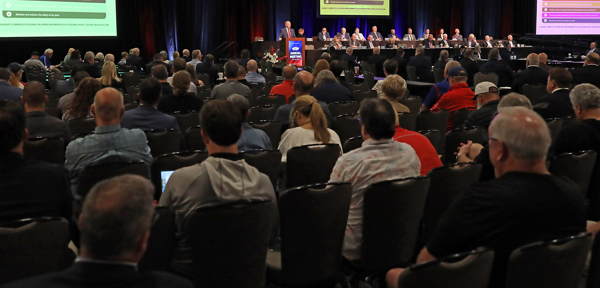Standing tall on the imposing stage of the Denver Marriott Tech Center, Kurt Weaver, You Can Play’s chief operations officer, spoke passionately to the crowd of almost 600 USA Hockey coaches, volunteers and officials.
Those occupying the seemingly endless rows and rows of seats all listened rapturously, bumping shoulders with members of their USA Hockey family from far and wide. Everyone in attendance had one common goal, ensuring USA Hockey’s core values of making the game fun, safe, and effectuating the game’s growth across all 50 states.
Weaver’s presentation was one of several part of a Town Hall that kicked off the annual four-day gathering of USA Hockey’s top volunteers in Denver in early June, and provided important education that carried forward into other conversations throughout the week.
Weaver’s message included ways to influence an inclusive hockey environment, particularly within LGBTQ+ community.
Small gestures can make big statements, Weaver said, whether they be observable or covert acts. Weaver uses the trademark “You Can Play” pin as an example of ways that miniature acts can have large impacts.
“What we constantly want to preach is small things make the biggest difference when done consistently and over time,” Weaver said. “The first time you put on a little pin, it’s not going to make a big difference. But come week three, come week six, come the next season that you’re wearing that same pin, that’s what gets noticed.”
Weaver and Stephanie Jackson, USA Hockey’s director of diversity and inclusion, both expressed that to be able to provide the best experience for every athlete that steps inside of a rink, education is key.
With continued education, the volunteers that help USA Hockey flourish are equipped with tools that allow them to provide the best experience possible for every player, parent, coach and official that the organization serves.
“With Kurt coming, he gave techniques and strategies for our volunteers to be able to show that we do support the LGBTQ+ community,” Jackson said. “Kurt gave our audience those different techniques and strategies that they can use so that they can feel confident in showing that support for that community.”
Zealous faces dotted the crowd, listening as Weaver talked about the importance of coaches helping contribute to an inclusive environment for their athletes.
“If a coach wants to, they could have a team speaking an entirely different language by the end of the season, and the players would do it because they follow coaches off a cliff. That’s the reality of it,” Weaver said. “People exampling the right words, right behavior and everything else, that’s all it takes.”
Weaver encouraged everyone in attendance to take what they learned during the Town Hall back to their communities with the ultimate goal of instilling authentic and palpable change for the better.
Jackson echoes Weaver’s message, seeing firsthand the impact of expanding education on diverse communities.
“At USA Hockey, over the years, we’ve really started to look at how we can connect with hockey on many different levels and many different ways,” Jackson said. “There’s no longer just one way to identify with hockey. There’s lots of ways to identify with hockey, and with us knowing more about the LGBTQ+ space, we can definitely create more opportunities around hockey that meet the needs of that community.”
Seeing USA Hockey’s top leaders in the audience was vital and incredibly important, Jackson said. Change begins with the top down, and when our leaders and change makers have a seat at the table to learn, that’s when we can begin to see tangible change.
“The more we learn, the more we can build and create those hockey experiences that meet some of the change throughout our communities,” Jackson said. “That’s how we are preparing ourselves, by continuing to educate ourselves. We’re starting with learning more about the community and embracing the community based on what we’re learning. The hope is that moving forward, there will be more opportunity for that demographic to play hockey.”
“We need to continue to embrace learning and understanding our differences,” said Pat Kelleher, executive director of USA Hockey. “The good news is that our volunteers and staff embrace learning and are invested in helping continue to move our sport forward, which includes efforts to be more inclusive.”



